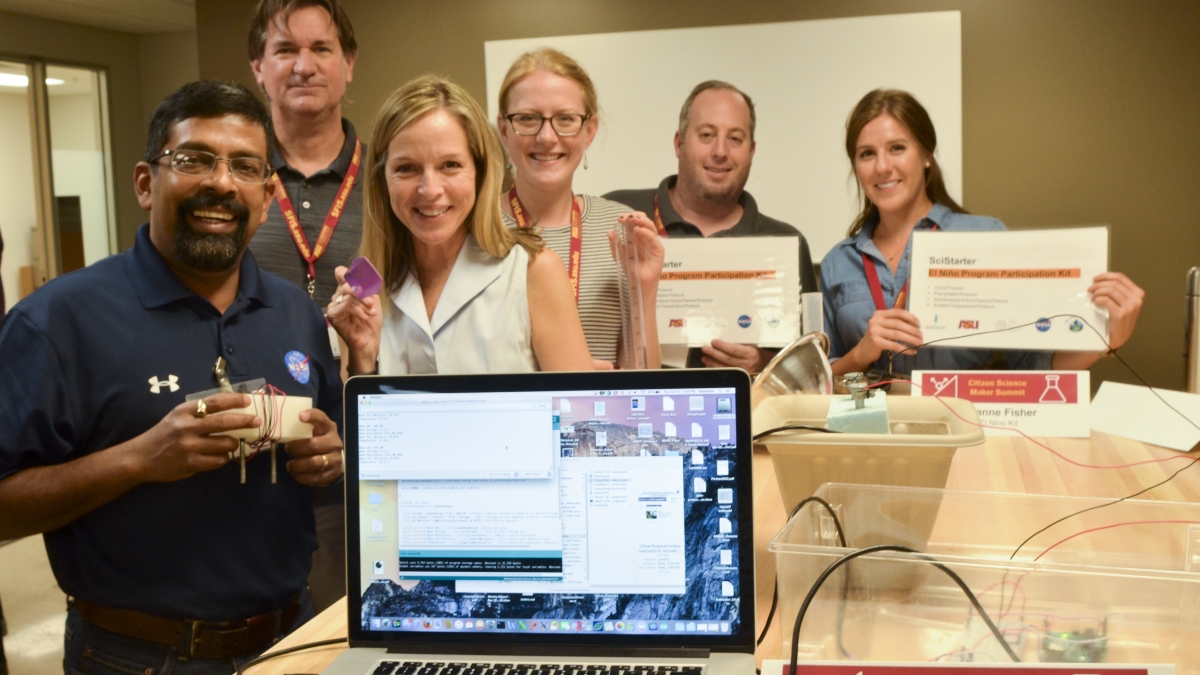ASU partners with public libraries to advance citizen science

ASU’s 2016 Citizen Science Maker Summit: (from left to right) Narendra Das, a research scientists at NASA Jet Propulsion Laboratory; Dan Stanton, associate librarian for academic services at ASU Library and co-investigator on the grant; Darlene Cavalier, professor of practice in ASU’s School for the Future of Innovation in Society and principal investigator on the grant; Catherine Hoffman, managing director of SciStarter; Micah Lande, assistant professor and Tooker Professor at The Polytechnic School; and Brianne Fisher, former ASU graduate student.
Arizona State University aims to position public libraries as key facilitators of citizen science, a collaborative process between scientists and the general public to spur the collection of data.
Through a new grant from the Institute of Museum and Library Services (IMLS), researchers from the School for the Future of Innovation in Society and ASU Library will develop field-tested, replicable resource toolkits for public libraries to provide to everyday people contributing to real research, from right where they are.
Despite growing interest from public libraries to incorporate citizen science programming into their role as go-to community hubs, Dan Stanton, associate librarian for academic services at ASU Library, says there are no documented road maps, best practices or models to follow.
“Our project team is well equipped to address this need, as there is substantial expertise in the area of citizen science here at ASU,” said Stanton, co-investigator on the grant.
Led by Darlene Cavalier, a professor of practice in the School for the Future of Innovation in Society, the grant brings together an interdisciplinary team of faculty and librarians to build on previous work around citizen science — a practice rapidly gaining in popularity, particularly at ASU.
In 2016, ASU hosted the Citizen Science Maker Summit, organized by Cavalier, who is also the founder of SciStarter, an online platform and ASU research affiliate, where more than 1,600 citizen science projects are registered online and open for support and participation. The projects include everything from observing or recording natural phenomena to developing software or instrumentation.
Cavalier also serves on the National Academy of Sciences committee on citizen science and is the co-founder of the Expert and Citizen Assessment of Science and Technology (ECAST) network.
“We know from previous research that too frequently the lack of access to low-cost instruments, coupled with an unmet desire to feel part of a community, creates a barrier to entry for would-be citizen scientists,” Cavalier said. “We are grateful to IMLS for supporting our effort to understand how the characteristics and capacities of librarians, their local communities and the scientists who need help from those communities can be supported through public libraries.”
As part of the grant, ASU will partner with six Arizona public libraries representing a mix of urban and rural and youth and senior populations.
The toolkits that will be developed for the libraries will offer multiple entry points that acknowledge varying library capacities and diversity of patrons.
Risa Robinson, coordinator of the grant and the assistant director of learning services at ASU Library, says libraries are ideal conduits for citizen science.
“Citizen science represents the kind of low-cost but impactful programming public libraries have always provided,” she said.
“With the increasing demand for science literacy, the growing interest in citizen science and the library’s strong community anchor, this partnership makes sense.”
More Science and technology

ASU graduate student researching interplay between family dynamics, ADHD
The symptoms of attention deficit hyperactivity disorder (ADHD) — which include daydreaming, making careless mistakes or taking…

Will this antibiotic work? ASU scientists develop rapid bacterial tests
Bacteria multiply at an astonishing rate, sometimes doubling in number in under four minutes. Imagine a doctor faced with a…

ASU researcher part of team discovering ways to fight drug-resistant bacteria
A new study published in the Science Advances journal featuring Arizona State University researchers has found…